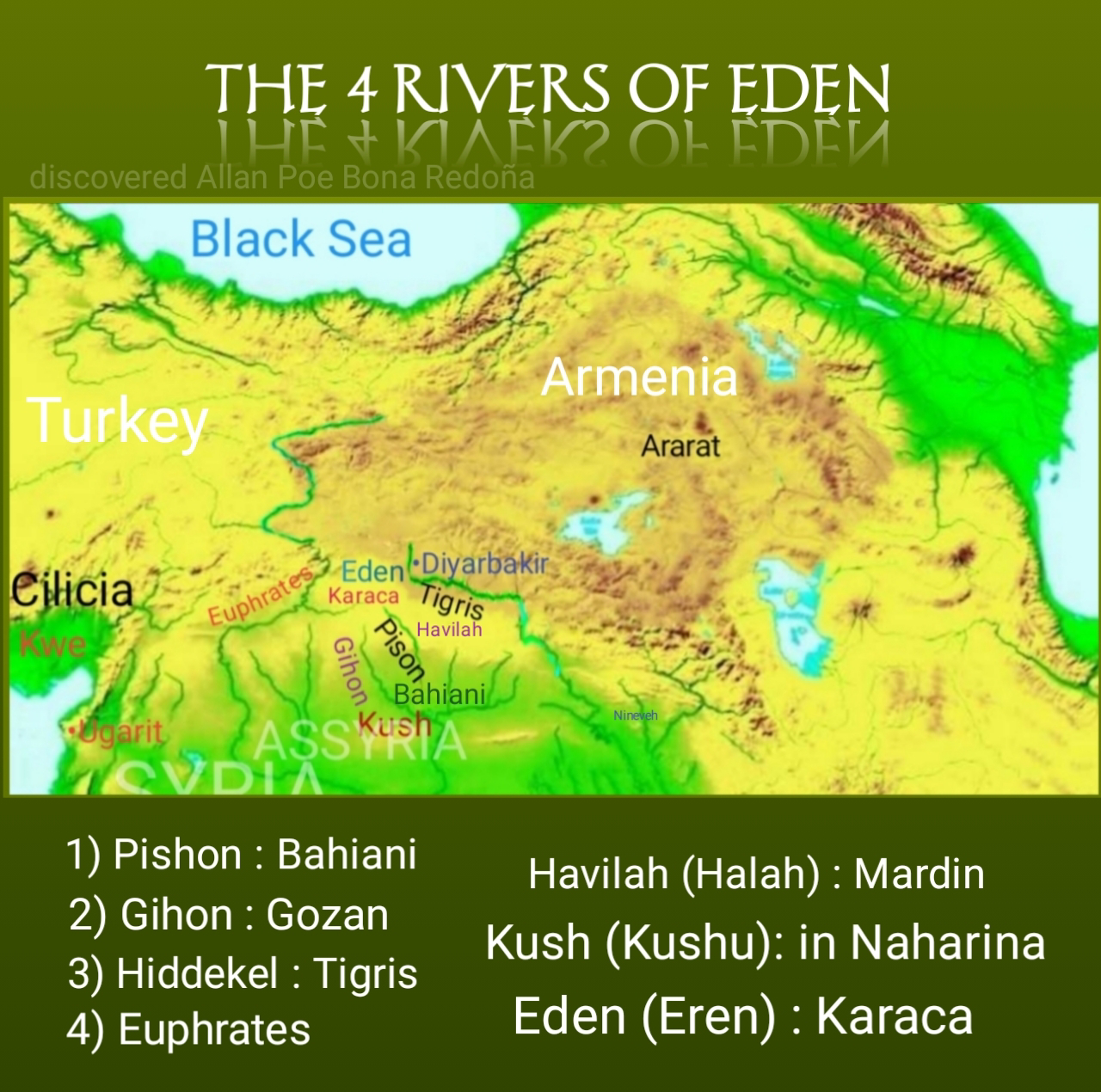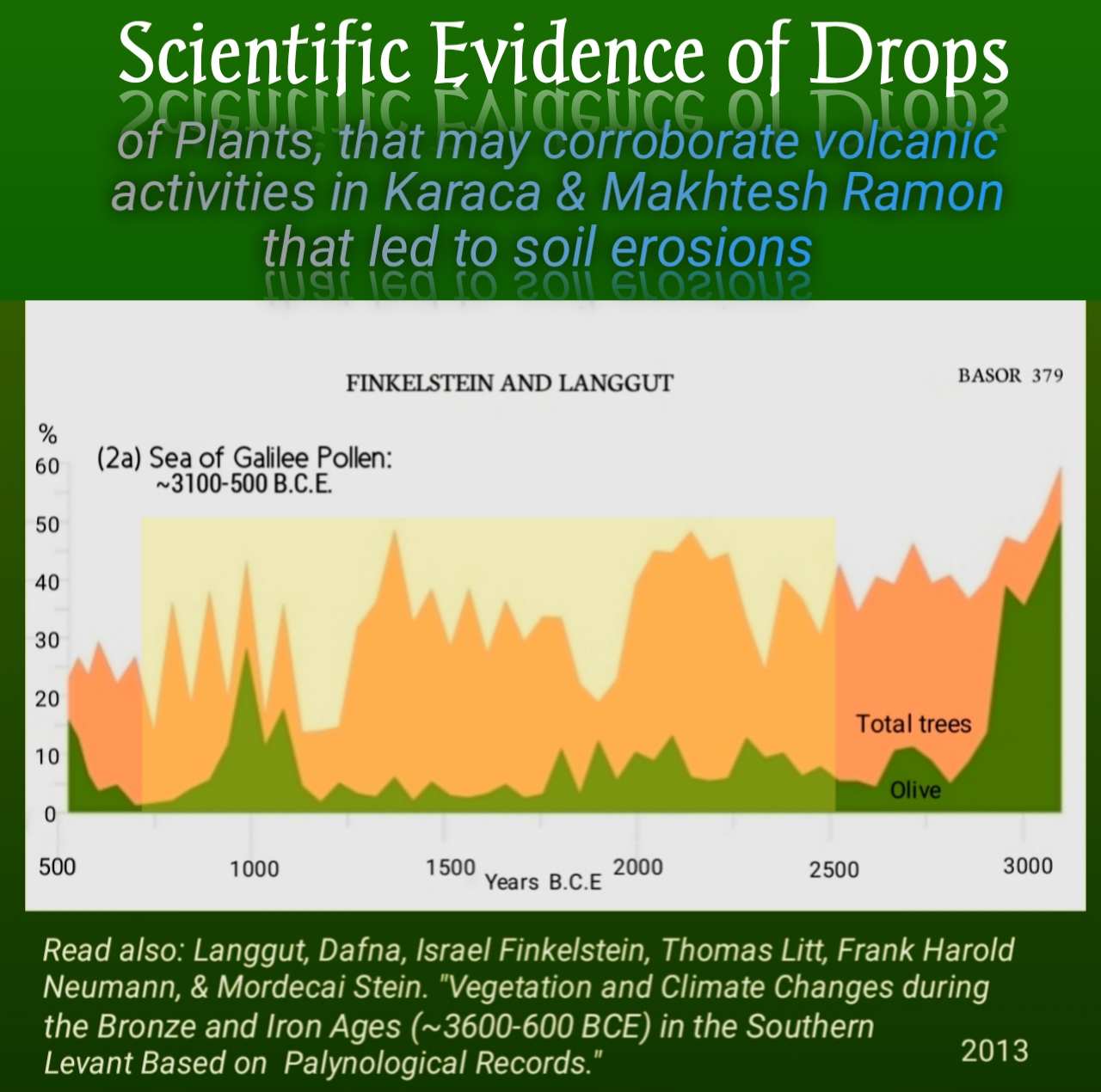"And a river went out of Eden to water the garden; and from thence [Eden] it was parted, and became into four heads.
The name of the 1st is Pison: it winds through the whole land of Havilah, where there is gold; And the gold of that land is good: there is bdellium [aromatic resin] and the onyx stone. And the name of the 2nd river is Gihon: the same is it that compasses the whole land of Kush.
And the name of the 3rd river is Tigris, which goes toward qidmat [front/east], of Assyria. And the 4th river is Euphrates.
And YHWH God took the man, and put him into the garden of Eden to dress it and to keep it." -Genesis 2:10-15
The location of Garden of Eden according to Genesis 2:14 was to the qidmat (front, east) of Assyria.
Moses uses the toponym "Havilah," which is called "Halah" by the Judahites and "Halahhu" by the Assyrians. Tablet K. 123 describes it "mat Halahhi" ("land of Halahhu"), in which may include the town of Lu-Ammu. According to king Amenhotep II, the "land of Amu" was in "ta netjer " ("land of God") in the country of Naharina. This people or location, "Amu," was known to the ancient Egyptians as the source of gold. If Assyrian record is accurate, this "Lu-Ammu" was belonged to Halahhu (the biblical Halah, Moses' Havilah) in Naharina, the region known to Egyptians as "land of God." The mine of gold near Diyarbakir (Dilmun) was in Mardin in Halah (Havilah), just west of Calah. Therefore, the gold mining site of Havilah (Halah) was in what the modern map named Mardin.
From this area of Havilah (Halah) runs the river of Pishon.
During the latter days of Moses or Joshua, the name "Pishon" was used by a tribe to be their origin, and likely translated it as "Bihiani" or "Bahiani." The river from Halah to Bit Bahiani was known "Pishon" in ancient time.
The change of "sh" (or "z") into "h" in the name is not unusual between Hebrew and Assyrian. An example is the Hebrew "Retsin" or "Rezin" ("Rezon") which becomes "Rahianu" ("Raqianu") in Assyrian text. Thus, Pashon or Pishon can be spelled also into "Bahiani" and Gihon into Gozan.
Both Eden and Pishon were used by some tribes to be their origins and called in Assyrian records as Bit Adini (Beth Eden, in the Bible) and Bit Bahiani.
Halah near north of Habur (Khabur) river is in Assyria.
"And the king of Assyria did carry away Israel unto Assyria, and put them in Halah and in Habor by the river of Gozan, and in the cities of the Medes" -2Kings 18:11
Another river which was later named for a place is Gizon or Gihon, which was transliterated by Israelites, who adopted Assyrian language, into "Gozan" (from "Guzana"). Gozan is located together with Haran, Rezeph, and Telassar or sons of Eden in the north, western Mesopotamia, and it is categorically identified "river" (1Chron 5:26). This river is connected to the Khabur or Habor river as apparently described in 2Kings 17:6.
"Have the gods of the nations delivered them which my fathers have destroyed, as Gozan, and Haran, and Rezeph, and the sons of Eden who were in Telassar?" -Isaiah 37:12
Rezeph, from Akkadian "Raṣappa" or "Rasapi," it is now represented by Rusafa, east of Tipsah and northeast of Hamath, and is regarded as the Ῥησάφα (Rhesapha) of Ptolemy. It was for some time under Assyrian dominion, and appears in a geographical list (2 R 53, 37a) preceded by Arrapha (Arrapachitis) and Halahhu (Halah), and followed by Tamnunu.
Telassar is the "Til-Ashurri" (the hill of Ashur) mentioned by Esarhaddon, and located it near the land of the Mitanni. During the Byzantine era, the hills south of Karaca dag (Mesha in Gen 10:29, and mount Masius in Strabo's book, 7.16.1) and now known town of Viransehir was called Telassar, which became Tella or Hor HaAssar. East of this Telassar is Mardin (Havilah/Halah). Genesis 10:29-30 describes Havilah to be located somewhere between Mesha (Mt. Masius) and Sephar (probably an ancient city of Sippar near Babylon). The split of rivers there going to Khabur were known to ancient Hebrews as "peleg," which was the name given to the son of Eber. One of the rivers is called Pishon (Bahiani).
"And unto Eber were born two sons: the name of one was Peleg; for in his days was
הָאָ֔רֶץ
ha-eretz
[the soil/earth]
niplegah [was split/divided];
and his brother's name was Joktan.
And Joktan begat ... Ophir, Havilah, and Jobab ... And their dwelling was from Mesha, as you go unto Sephar a mount of the east." -Genesis 10:25-26,29-30
Ophir became known for gold and during the time of Job it was borrowed and used as a toponym in Kush (Makhtesh Ramon), hence the name Havilah was also used south of that region, and the name Kush was also borrowed from Naharina to Makhtesh Ramon. In EA 288, lines 1-66 Abdiheba of Jerusalem describes "Naharima" (Mitanni) to king Akhenaten (1334 BCE) as a neighborhood of Kush. Genesis 2:13 says that Gihon (Gozan) river winds throughout the land of Kush.
It was in the days (1928 BCE) of Peleg when the soil or earth was divided, whose collateral effect might have affected the plants in Mediterranean region indirectly.
The sons of Korah received the following teaching, probably from Moses, regarding the removal of soil to the lakes.
"Therefore will not we fear, though the earth be removed, and though the mountains be carried into the midst of the sea; Though the waters thereof roar and be troubled, though the mountains shake with the swelling thereof. Selah. There is a river, the
pelegaw [streams]
whereof shall make glad the ir-Elohim [city of God], the
qedosh [holy (place)]
of the tabernacles of the Elyon [most High]. The heathen raged, the kingdoms were moved: He uttered His voice, the
earth melted.
Come, behold the works of YHWH, what desolations He has made in the earth." -Psalms 46:2-4,6,8
It seems that there was another melting of soil during the time (1928 BCE) of Peleg, and this could be related to the split of land somewhere in the region.
The location of Peleg was from Mesha to Sephar. The name Peleg may mean split river, which could be referring to the rivers of Gihon (Gozan), Pison (Bahiani), and of Halah.
All what we discovered now is that the garden of Eden was once stood in the northern Mesopotamia, west of Diyarbakir just on front of Assyria.







No comments:
Post a Comment